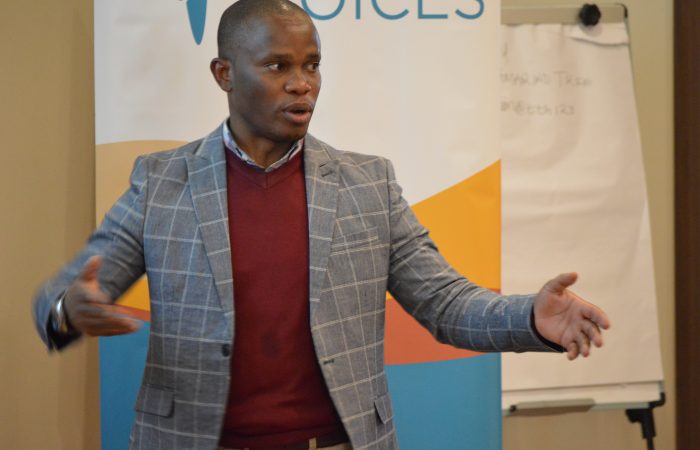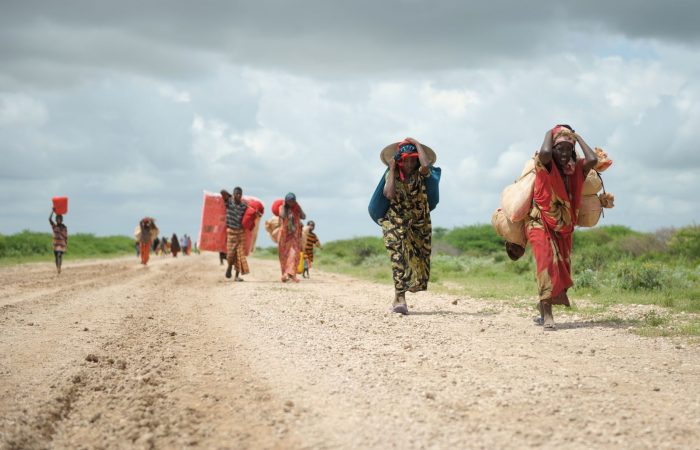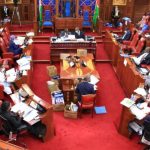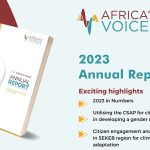The extended drought in Somalia continues to have a devastating impact across the country. Since early 2017, when the crisis deteriorated and the threat of famine loomed, the number of people in emergency level of food insecurity (IPC Phase 4) has increased to 866,000. Over the same period, over 1,159 people lost their lives in a devastating cholera outbreak that affected multiple regions.
Although a quick scale-up in humanitarian assistance has averted famine, much work remains to be done to ensure full recovery of livelihoods and increase resilience.
In this context, UNICEF Somalia has been scaling up its cash transfer programme for those in need. Complementing the World Food Programme’s (WFP) food security interventions, UNICEF’s unrestricted cash transfer programme assists people to meet their ‘non-food’ needs, such as shelter, education and investment in livelihoods. The money itself is distributed by providing top-ups to an electronic voucher card that can then be used to access cash at specific financial service providers.
The challenge of accountability and responsiveness in humanitarian emergencies
AVF, like UNICEF, believes that, in order to effectively deliver aid in a timely manner it is essential that humanitarian programmes such as this one are adaptive, responsive and ultimately accountable to the perspectives and experiences of those affected. In Somalia, ensuring good ‘humanitarian governance’ becomes particularly crucial in a context where government institutions still have a limited reach, and aid agencies have a huge say in who accesses services and how.
Indeed, if humanitarian crises are fundamentally failures of governance, then the path to averting catastrophe and eventual recovery must be grounded in engagement with the voices of affected populations.
Yet achieving this can be difficult in fast-changing contexts where insecurity and a lack of infrastructure create operational difficulties and can prevent effective communications with beneficiaries.
To overcome these obstacles and provide accountability to affected populations, UNICEF asked Africa’s Voices Foundation (AVF) to set up systems to support more adaptive, transparent and responsive programming. We designed two systems, leveraging the accessibility of mobile phones, to meet this objective:
- A two-way communication channel which provided crucial information to beneficiaries and elicited feedback on the programme from them via SMS
- Post-distribution monitoring via SMS and IVR on delivery of cash and outcomes for beneficiaries
1. Two-way communications channel with beneficiaries
Voice messages were sent to the mobile phones of programme beneficiaries, collected previously through WFP’s SCOPE platform, so that they could understand their cash entitlement and receive instructions on how to claim it. Information was also provided on how to register feedback and complaints with the cash transfer programme via a toll-free SMS channel.
Issues raised by beneficiaries were analysed and tagged, before being passed on to UNICEF for resolution. In response to beneficiaries’ specific complaints, AVF also sent targeted voice (IVR) and SMS communications with relevant information.
This feedback system was deployed pairing UNICEF’s RapidPro SMS platform with Somleng, an open source interactive voice response (IVR) technology.
The two-way channel proved to be an accessible and widely used system. One cash transfer programme focused on returnees to Somalia from the Dadaab and Dhobley refugee camps, and supporting their reintegration to their home country. Of this group, over 60% of those with mobile phones raised an issue or concern by SMS using this channel. The system was used equally by men and women, although it was more widely used by younger beneficiaries.
IMPACT OF FEEDBACK LOOP ON THE PROGRAMME
The two-way communications platform had a tangible impact on UNICEF’s programmes, allowing them to respond more effectively to bottlenecks to distribution and iteratively adapt their programming. The following cases exemplify how this worked in practice:
- After voice messages informed a group of beneficiaries of their cash entitlement in Mogadishu, they arrived at the office of UNICEF’s implementing partner to top up their electronic voucher card but were unable to redeem their entitlement for technical reasons. Beneficiaries were able to use the SMS feedback channel to raise the specific issue, along with other complaint mechanisms. This led to UNICEF resolving the technical issues on the ground and extending the programme so that the beneficiaries could finally receive their aid.
- Beneficiaries reported instances of diversion; they reported being escorted by influential people in their Internally Displaced Persons (IDP) camp when receiving their aid, who would then take a percentage of the money intended for the beneficiary. Similar incidents involved beneficiaries arriving to receive their money, but then being given food instead of cash. UNICEF was able to use this data to quickly follow up with their on-the-ground partners and resolve these issues.
- Some messages asked for further information on the distribution process such as the exact location or business hours of top-up points. In response, AVF in collaboration with UNICEF sent messages tailored to individual responses with further details, and where necessary, sent the phone numbers of specific operatives on the ground to allow beneficiaries to seek further clarification.
Other cases raised by beneficiaries through the feedback loop are informing UNICEF’s next iteration of its programme design. Displaced returnees on the move often reported that they were very far from the expected top-up point or the financial service provider. They also reported being too old or sick to retrieve their cash. Several times beneficiaries even suggested that they might be able to receive the transfer by mobile money transfer instead.
AVF’s analysed these cases and contributed these crucial citizen perspectives to discussions at UNICEF about switching to cash distribution through mobile phones. AVF will collect further data to try and quantify the use of mobile money services amongst beneficiaries and assess the viability of using this modality.
NEXT STEPS
This two-way system will be scaled up so that targeted SMS and voice messages are sent out rapidly. For simple and frequent requests, cases will be responded to daily. For new or more complex issues, we aim for a response within a week.
AVF will also work with UNICEF to develop a case management and analysis system, integrated with their other feedback channel, to support quick identification and handling of issues raised by affected populations.

2. Post-distribution monitoring and evaluation
The second pillar of AVF’s support to adaptive cash transfer programming was to develop systems for post-distribution monitoring via SMS, in order to answer key quantitative questions about the programme, such as whether distribution was successful, how the cash was being used, and whether it was affecting key outcomes for affected populations. In order to ensure sufficient engagement with monthly PDMs, the following approach was used:
- Participants were first sent a voice message to explain the purpose and value of the survey and how their voice will form a key part of programme evaluation.
- They were then sent an SMS survey to monitor and assess UNICEF’s programming. Including a voice message prior to the SMS survey seemed to increase response rates from 5-10% to 40%.
- Non-respondents to the SMS survey received a survey by IVR to ensure that those who are illiterate are not excluded from the evaluation.
In initial surveys to returnees from Dadaab and Dhobley, AVF has provided key qualitative data for programme reporting. For example, the feedback shows that some people had used the money on food, suggesting that the combined UNICEF and WFP intervention was not working as intended.
Some returnees had used the money to invest in their future livelihoods by setting up businesses, buying goods to trade, and land and productive assets. This provided evidence to UNICEF that the programme had worked to support the return to Somalia of certain individuals.
Amplifying voices for effective and accountable humanitarian efforts
Together these systems put the voice of affected people at the heart of humanitarian programming and they go some way towards closing the governance gap between agencies and those in need.
However, whilst establishing accountability to affected populations can be crucial to delivering appropriate and life-saving assistance, it can and should go beyond supporting instrumental delivery of aid just to keep negative indicators at bay.
More work still needs to be done to these scale these systems so that they can contribute to the foundations of long-term sustainable civic engagement on how resources are managed in Somalia.
Top photo credit: Man outside Somalia’s National Theatre in Mogadishu, AU-UN IST PHOTO / TOBIN JONES.




